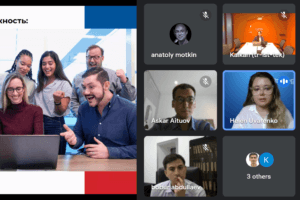Join the upcoming panel discussion co-organized by StrategEast, the University of Central Asia, the Aga Khan University and USAID’s Future Growth Initiative (FGI) for Central Asia on June 23, 2021, at 14:00 (GMT +5) | 11:00 CET.
The audience can join with:
https://us02web.zoom.us/s/86455643835?pwd=UVRrTmo4RHhURUV6Nm5tZnorTytFQT09 Passcode: 039067 or watch Facebook Live broadcasting to StrategEast Facebook page and the University of Central Asia Facebook page.
Language: English with simultaneous Russian translation
About the event
The Ministry of Industry and New Technologies of the Republic of Tajikistan announced the creation of a Digitalization Council to create the first High-Tech Park in the country. During several panel discussions co-organized by StrategEast and the University of Central Asia, international experts came to the unanimous opinion that the creation of a High-Tech Park can make a great contribution to the economic development of Tajikistan, and transition from an industrial to a knowledge economy.
However, in addition to economic growth, the IT park can also contribute to the inclusiveness of economic development. It would be designed to make sure that the creation of a new IT park does not lead to an increase in the gap between rich and poor, between urban and rural areas, and ensure gender equality. Such issues will be raised at the panel discussion “How to be inclusive when creating an IT park in Tajikistan”.
Panel moderators:
Farhod Bilolzoda, Deputy Minister of Industry and New Technologies, Republic of Tajikistan
Shaukat Ali Khan, Chief Information Officer at the Aga Khan University and Hospitals.
Issues to be discussed include:
– How to organize distance learning in demand-driven IT specialties for young people from remote regions of Tajikistan.
– How the State can support women’s entrepreneurial initiatives associated with the digital transformation process.
– What are the best practices in the region that could be applicable to Tajikistan.
– The role of international financial organizations and development institutions in promoting inclusiveness in the construction of the IT industry in Tajikistan.
Panel participants:
Farhod Bilolzoda, Deputy Minister, Ministry of Industry and New Technologies of the Republic of Tajikistan.
Prior to his position Farhod has worked in various sectors – public, private and international, particularly worked as a Director of different Departments at the National Bank of Tajikistan (NBT), Corporate Secretary at the JV Tajik-Chinese Company “TTGP, energy and trade expert at Energy Charter Secretariat based in Brussels, and Deputy Director of Department at the Ministry of Energy and Industry of the Republic of Tajikistan.
Farhod holds several degrees, graduate and post-graduate programs in economics, international and engineering. He is also a Certified Graduate and Fellow of the Fletcher School’s Leadership Program for Financial Inclusion at Tufts University.
At the NBT Farhod tremendously contributed to the initiation and implementation of projects RTGS, NPCR, DFM ERP/CRM, debut issuance of Eurobonds.
Shaukat Ali Khan, Chief Information Officer (CIO) at the Aga Khan University and Hospitals.
On his current position, Shaukat Ali Khan is responsible for all ICT systems and services across AKU’s global portfolio of Hospitals, Medical Centers and University locations in Asia, Africa, and United Kingdom.
Shaukat joined AKU from the University of Central Asia (UCA), where he held the position of CIO; during his time at UCA, Shaukat implemented digital transformation strategies relating to information management, processes, infrastructure, cybersecurity and distance learning initiatives among other pivotal responsibilities. He was also a part of the UCA’s Executive Management team leading the IT organization of the University and its institutions across fifteen geographic locations in four countries.
Prior to that, he was the Head of the IT production infrastructure of the global production facilities at Novo Nordisk HQ in Copenhagen, Denmark.
Ali Khan holds a Master of Science in Computer Science (MS-CS) with an emphasis on IT management and strategic change from Blekinge Institute of Technology, Karlskrona, Sweden. He is also a Harvard Business School certified Dynamic Manager and Leader, equipped with the tools and best practices available in leadership, strategy development, project management, change management, decision making, career management, and difficult interactions.
Anatoly Motkin, President of StrategEast center for a new economy.
Mr. Motkin is a successful technology investor with years of experience in political consulting and media entrepreneurship in the Eurasian region. He began his career as a political consultant both in Israel and Eurasia. He later moved from politics to media, helping to start one of the leading Russian language media companies in Israel. Mr. Motkin has served as an advisor and investor to both the public and private sectors, by successfully backing a number of Israeli IT projects, developed in the High Technologies Park in Belarus.
As his career has shifted over time, Mr. Motkin has consistently shown his dedication to improving business practices and government transparency in the Eurasian region. Mr. Motkin’s extensive background has led him to deepen his focus on reinforcement of the values of rule of law and private property protection in the former Soviet region through the creation of StrategEast.
Zarrina Rajabova, Director of Alif Academy.
Previously to holding the current position, Ms. Rajabova was the head of the IT department of Alif Bank. She has over four years of experience in managing IT products development, such as Core Banking System, Customer Relationship Management System, HR system, Online Banking and lots of other small products.
Currently in the Alif Academy she helps people to find new coding skills that will give them a good income without being separated from their families. Alif Academy is actively working on the development of the learning platform OpenJS School where everyone can learn coding for free, conducts offline and online courses, special courses for girls, and courses for children from 1st grade at schools.
Firuz Saidkhadzhaev, Project Manager/Economic Development Advisor, United Nations Development Programme (UNDP).
Mr. Firuz Saidkhadzhaev has more than 10 years of working experience working with international organizations on public finance management, entrepreneurship, startup ecosystem and trade development, ICT, youth and gender empowerment. He has a working experience with governmental agencies, UNDP, World Bank and other organizations. He is coordinating several initiatives, including Startup Choihona, InnoResponse Challenge and Business Constructor.
Filip Stoyanovich, Chief of Party, USAID’s Future Growth Initiative (FGI) for Central Asia
Mr. Stoyanovich has been involved in economic development in Europe and Eurasia for over 25 years. He specializes in enhancing competitiveness and clusters, IT, startup ecosystems, agribusiness and tourism sector development and promotion, investment promotion, Government relations, National Policy development, management and administration of international development programs, regional trade and business cooperation, business associations, public-private sector cooperation and SME development.
Since 2007, Mr. Stoyanovich has been Chief of Party of three USAID-funded regional programs, the Regional Competitiveness Initiative (RCI), the Regional Economic Growth (REG), and currently the FGI. In this role, he has developed continuous professional relationships with stakeholders throughout the region, including donors, the private sector, think tanks, and business associations. He has collaborated with international donors and organizations such as the European Union, EBRD, IFC, CBI, SIDA, Swiss, ITC, UNDP, World Bank, GIZ, UNWTO, and UNESCO.
Bagrat Yengibaryan, PhD, Director of Enterprise Incubator Foundation (EIF), Armenia.
As the Director of EIF, Dr. Yengibaryan is managing activities of the Engineering city, Cybersecurity Incubator, Armenian-Indian IT Center of Excellence, Innovative Solution & Technologies Center, Gyumri Technology Center, Vanadzor Technology Center, Innovative Solutions and Technologies Center and mLab ECA – Regional Lab for Mobile Applications. Annually supporting more than 100 tech companies and training more than 3000 specialists. Dr. Yengibaryan is also coordinating several acceleration programs including Innovation Matching Grants Competition, Science & Technology Entrepreneurship Program (STEP) in Armenia.
As the Director of EIF, he is co-founder and advisory board member of the first-in-Armenia Venture Capital Fund – Granatus Venture Fund. Mr. Yengibaryan is also a co-founder and board member of Microsoft Innovation Center in Armenia, Armenian National Engineering Labs, Gyumri IT Centre, Union of IT employers, Engineering Association, 3D Association.
Dr. Yengibaryan has also served as an IT Development International Expert, providing consultancy to the Governments of many countries worldwide including Moldova, Ukraine, Montenegro, Iran, countries of Latin America, etc.
Dr.Yengibaryan holds an MBA from the American University of Armenia, Ph.D. in Mathematics, Armenian National Academy of Sciences and MS in Mathematics, Yerevan State University.
Organizers:
StrategEast center for a new economy has the mission to reinforce the values of the rule of law and private property protection in Eurasian and Baltic countries through the transition from natural‑resource‑based to knowledge-driven economies. Its work is focused on the 14 countries that proclaimed or restored their independence after the collapse of the USSR: Armenia, Azerbaijan, Belarus, Estonia, Georgia, Kazakhstan, Kyrgyzstan, Latvia, Lithuania, Moldova, Tajikistan, Turkmenistan, Ukraine, and Uzbekistan. StrategEast is a registered 501(c)3 organization based in the United States with regional offices in Ukraine and Georgia.
The University of Central Asia was founded in 2000 as a private, not-for-profit, a secular university under an International Treaty signed by the Presidents of Tajikistan, Kyrgyzstan and Kazakhstan, and His Highness the Aga Khan; ratified by their respective Parliaments and registered with the United Nations. The University is a unique institution of higher education focused on the development of mountain societies, with its School of Arts and Sciences campuses in Naryn (Kyrgyzstan) and Khorog (Tajikistan), designed by award-winning architect, Arata Isozaki. The Tekeli campus in Kazakhstan is currently in the planning phase. UCA’s Graduate School of Development has three research institutes, and its School of Professional and Continuing Education has graduated over 172,000 learners since 2006.
USAID is the world’s premier international development agency and a catalytic actor driving development results. For more information, visit the USAID Central Asia website: https://www.usaid.gov/central-asia-regional and Facebook page: https://www.facebook.com/USAIDCentralAsia. To know more about the U.S. Mission’s work in Kazakhstan, visit https://kz.usembassy.gov/ and Facebook: https://www.facebook.com/usembassy.nursultan.




